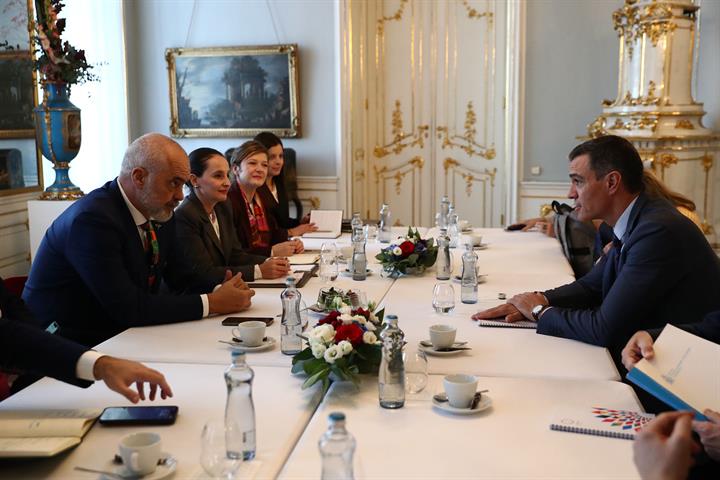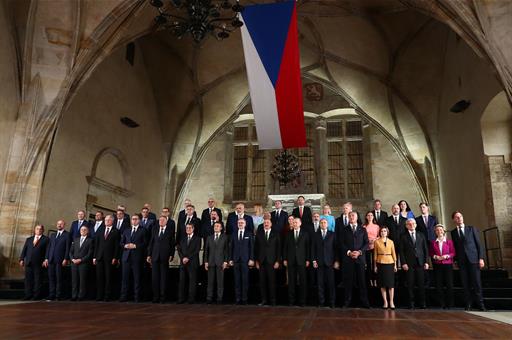Pedro Sánchez underlines the important message of unity sent from the meeting of 44 leaders when the war against a European country "affects us all"
President's News - 2022.10.6
Prague (Czech Republic)
This meeting was particularly relevant given the current situation on the continent caused by Russia's war in Ukraine. The summit was attended by the heads of state and government of the 27 EU member states and 17 neighbouring countries who, as Pedro Sánchez stressed, are sending "a message of cooperation and unity at a time when the war against a European country affects us all".
Convened by the President of the European Council in cooperation with the Czech Presidency under the motto 'Back to back', the 27 Member States, the EFTA countries (Norway, Iceland, Switzerland and Liechtenstein), the UK, the Western Balkan partners (Albania, Bosnia and Herzegovina, Kosovo, Montenegro, North Macedonia and Serbia), Ukraine, Moldova, Georgia, Armenia, Azerbaijan and Turkey met today in Prague. Pedro Sánchez took part in the round tables held during the summit on peace and security, and on energy, climate and the economic situation.
The President of the Government of Spain reaffirmed that "My government will not take a single step backwards, not one, that will divert us from our climate goals. On the contrary, we are more determined than ever to accelerate the deployment of renewable energies and the decarbonisation of our economy, because this will bring us closer to European energy sovereignty".
Pedro Sánchez, during his speech, defended the need to carry out emergency and structural actions. To this effect, Spain has adopted measures worth some €35 billion in targeted transfers and tax reductions to protect the working middle class, SMEs and hard-hit sectors, in addition to a windfall profits tax on energy companies and banking institutions.
Furthermore, with the plan of energy saving and efficiency measures implemented by the Government of Spain in August, electricity consumption has been reduced by 4.1% compared to last year, without affecting economic activity or the quality of life of the population. This measure is in addition to the Iberian mechanism to decouple the price of gas from the price of electricity, which was launched in June and has enabled consumers to save more than €2.6 billion.
Energy Sovereignty of the European Political Community
 The President of the Government of Spain, Pedro Sánchez, and the Prime Minister of Albania, Edi Rama | Pool Moncloa/Fernando y Calvo y Pool Consejo Europeo
The President of the Government of Spain, Pedro Sánchez, and the Prime Minister of Albania, Edi Rama | Pool Moncloa/Fernando y Calvo y Pool Consejo Europeo
The President of the Government of Spain, before the European leaders of the EPC, pointed out that it is a priority to continue carrying out emergency actions coordinated at European level in three areas to control the price of energy: limiting the price of gas, strengthening liquidity and centralised gas purchasing at European level. In this respect, Sánchez also pointed out that "the participation of non-EU countries in these measures would be of greater benefit to the European Political Community as a whole".
Sánchez stressed the importance of this forum, which is not a substitute for enlargement, but a platform to "listen to each other, cooperate in the areas that affect us all and promote our alignment", and take decisions to combat the climate emergency.
For this reason, the Chief Executive defends the need to strengthen interconnections, pooling electricity and gas infrastructures in Europe, to achieve greater energy sovereignty. The second measure also seeks to accelerate the deployment, storage and efficiency of renewables, in particular green hydrogen, key to a clean, secure and affordable energy future.
"It is essential to continue to work together, not only at EU level, but also with other European partners, to respond to the impact of rising energy prices on our citizens and businesses. The costs of inaction are too high," concluded Pedro Sánchez.
During the day, the President of the Government of Spain held bilateral meetings with heads of state and government from different countries, with whom he discussed Spain's forthcoming presidency of the EU in the second half of 2023. With the President of the Swiss Confederation, Ignazio Cassis, he discussed bilateral relations, with a special focus on the important scientific community resident in Switzerland. During meetings with the Prime Minister of Albania, Edi Rama, and the President of Moldova, Maia Sandu, Sánchez discussed the EU enlargement process.
During the meeting with the President of Turkey, Recep Tayyip Erdoğan, the leaders discussed the EU accession negotiations, whereby Spain supports a positive agenda, and addressed the situation in Ukraine and the need to extend the grain export agreement.
Non official translation





